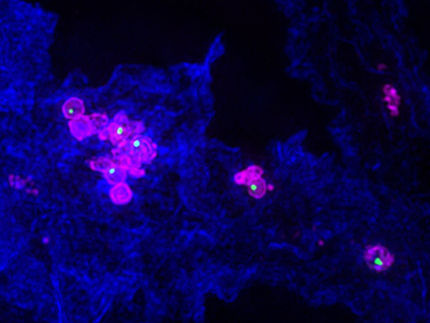Chemist gets US patent for solution to resistance problem
A chemist based at the University of Copenhagen has just taken out a patent for a drug that can make previously multidrug-resistant bacteria responsive to antibiotics once again. Jørn Bolstad and his chemist colleagues hope that the substance will soon be able to tackle the tremendous problems associated with multidrug resistant tuberculosis (MDR-TB). But first, they need to find investors interested in getting the substance onto the market.
Before the development of penicillin, people dropped like flies in response to minor infections: in the lungs, in small cuts. Even pimples could grow to boils that killed. But one of the main killers prior to the discovery of antibiotics was tuberculosis.
The deadly infectious disease that typically affects the lungs has returned. It has developed a resistance to the majority of antibiotics that would otherwise kill the tuberculosis bacteria. Currently, the disease does not pose an imminent threat to Denmark or the West. However, resistant strains of the bacteria are nearing the region's borders. This is one of the reasons why doctors around the world are busy trying to solve the problem of drug resistance.
The bacteria shed killing substances
While those bacteria that have developed a resistance remain vulnerable to antibiotics, they have developed an ability to shed bacteria killing substances before any damage is done to them. Colloquially, this is referred to as pooping the substance out, but the scientific formulation is that these bacteria activate an efflux pump.
Jørn Bolstad Christensen has isolated a substance able to block the efflux pump so that an antibiotic remains in bacteria until the bacteria dies.
"You could say that we cure bacteria of their resistance, and slay them with antibiotics", explains Associate Professor Jørn Bolstad Christensen.
From antipsychotic to killing bacteria
Working with doctors Jette Kristiansen from the University of Southern Denmark and Oliver Hendricks from the King Christian X’s Hospital for Rheumatic Diseases in Gråsten, Denmark, Jørn Bolstad Christensen discovered that Thioridazin, an antipsychotic drug, was able to kill bacteria without any noticeably harmful effects upon humans. Still, the chemists had an idea that could make the substance more benign.
"We now have a substance that is able to block the bacteria’s efflux pump. At very most, recipients of the medication may become slightly sluggish. This is also because very small doses are needed to affect the bacteria", says Jørn Bolstad Christensen.
Researchers hope for quick approval
Because Thioridazin is an approved drug, the research team hopes that the new anti-resistance medication, JEK 47, will be approved without going through the entire process that new pharmaceuticals are typically subjected to. If this is the case, JEK 47 will most likely be a cheap medication that a pharmaceuticals manufacturer could release quickly. However if an investor does not show interest, Christensen is certain about his next step.
"I would rather donate this discovery to an NGO able to use this substance in poor countries that suffer from drug-resistance problems than watch it collect dust in the industrialised world. So, I hope that an investor comes along to develop this ground-breaking substance", concludes Bolstad Christensen.
Topics
Organizations
Other news from the department science

Get the life science industry in your inbox
By submitting this form you agree that LUMITOS AG will send you the newsletter(s) selected above by email. Your data will not be passed on to third parties. Your data will be stored and processed in accordance with our data protection regulations. LUMITOS may contact you by email for the purpose of advertising or market and opinion surveys. You can revoke your consent at any time without giving reasons to LUMITOS AG, Ernst-Augustin-Str. 2, 12489 Berlin, Germany or by e-mail at revoke@lumitos.com with effect for the future. In addition, each email contains a link to unsubscribe from the corresponding newsletter.





















































